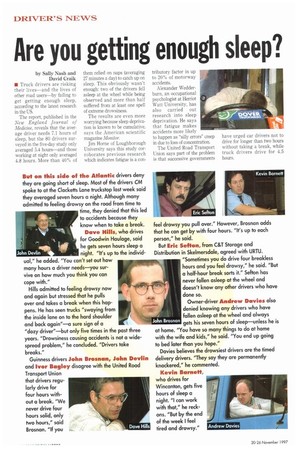Are you getting enough sleep?
Page 24

If you've noticed an error in this article please click here to report it so we can fix it.
by Sally Nash and David Craik • Truck drivers are risking their lives—and the lives of other road users—by failing to get getting enough sleep, according to the latest research in the US.
The report, published in the New England Journal of Medicine, reveals that the average driver needs 7.1 hours of sleep, but the 80 drivers surveyed in the five-day study only averaged 5.4 hours—and those working at night only averaged 4.8 hours. More than 40% of
them relied on naps (averaging 27 minutes a day) to catch up on sleep. This obviously wasn't enough: two of the drivers fell asleep at the wheel while being observed and more than half suffered from at least one spell of extreme drowsiness.
The results are even more worrying because sleep deprivation is known to be cumulative, says the American scientific magazine Monitor.
Jim Home of Loughborough University says this study corroborates previous research which indicates fatigue is a con
tributory factor in up to 20% of motorway accidents.
Alexander Wedderburn, an occupational psychologist at Herriot Watt University, has also carried out research into sleep deprivation. He says that fatigue makes accidents more likely to happen as "silly errors" creep in due to loss of concentration_
The United Road Transport Union says part of the problem is that successive governments have urged car drivers not to drive for longer than two hours without taking a break, while truck drivers drive for 4.5 hours.
But on this side of the Atlantic drivers deny they are going short of sleep. Most of the drivers CM spoke to at the Clacketts Lane truckstop last week said they averaged seven hours a night. Although many admitted to feeling drowsy on the road from time to time, they denied that this led to accidents because they know when to take a break.
Dave Hills, who drives for Goodwin Haulage, said he gets seven hours sleep a night. "It's up to the individual," he added. "You can't set out how many hours a driver needs—you survive on how much you think you can cope with."
Hills admitted to feeling drowsy now and again but stressed that he pulls over and takes a break when this happens. He has seen trucks "swaying from the inside lane on to the hard shoulder and back again"—a sure sign of a "dozy driver"—but only five times in the past three years. "Drowsiness causing accidents is not a widespread problem," he concluded. "Drivers take breaks."
Guinness drivers John Brosnan, John Devlin and Ivor Bagley disagree with the United Road Transport Union that drivers regularly drive for four hours without a break. "We never drive four hours solid, only Iwo hours," said Brosnan. "If you feel drowsy you pull over." However, Brosnan adds that he can get by with four hours. "It's up to each person," he said.
But Eric Sefton, from C&T Storage and Distribution in Skelmersdale, agreed with URTU. "Sometimes you do drive four breakless hours and you feel drowsy," he said. "But a half-hour break sorts it." Sefton has never fallen asleep at the wheel and doesn't know any other drivers who have done so.
Owner-driver Andrew Davies also denied knowing any drivers who have fallen asleep at the wheel and always gets his seven hours of sleep—unless he is at home. "You have so many things to do at home with the wife and kids," he said. "You end up going to bed later than you hope."
Davies believes the drowsiest drivers are the timed delivery drivers. "They say they are permanently knackered," he commented.
Kevin Barnett, who drives for Wincanton, gets five hours of sleep a night. "I can work with that," he reckons. "But by the end of the week I feel tired and drowsy."
















































































































